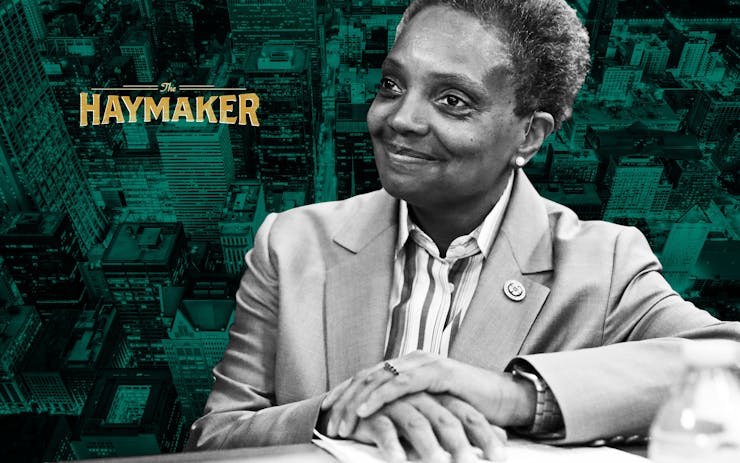‘The Haymaker’ is Leafly Deputy Editor Bruce Barcott’s opinion column on cannabis politics and culture.
In Sunday’s Chicago Sun-Times, reporter Tom Schuba laid out a compelling case for embracing retail cannabis stores in one of America’s greatest cities. Headline: “Crime fell near pot shops after marijuana was fully legalized, Colorado study shows.”
The Mayor is afraid that tourists and business people might be offended by cannabis stores. Who does she think is buying cannabis?
Just as Leafly found in our study of dispensary myths earlier this year, Schuba reported that “new research shows crime rates dropped substantially in areas with marijuana dispensaries, running counter to fears that pot shops drum up crime.” His story anticipated the expected fears that many Illinois residents may have regarding adult-use legalization, which is scheduled to start statewide on Jan. 1, 2020.
Chicago Mayor Lori Lightfoot reacted to the Sun-Times story in a rather odd manner. Three days after its publication, she proposed banning retail cannabis stores from Chicago’s Central Business District and residential areas. Because… why, exactly?
Deputy Mayor Samir Mayekar explained. Mayekar told the Associated Press that a downtown “exclusion zone” is warranted because of its high density of business and tourists. (Chicago actually has a law that defines the Central Business District. It’s enormous. If you’re at Navy Pier above Lake Michigan, the far western edge of the Business District is more than two miles away.)
Mayor’s plan: Boost illegal sales
So instead of licensing and regulating cannabis stores, Mayor Lightfoot wants to boost the illegal cannabis market in the downtown core and in residential neighborhoods. Because that’s what happens when regulated stores are prohibited: Illicit sellers thrive. Unlicensed delivery services pop up.
Chicago residents, denied the opportunity to purchase clean, safe, lab-tested products, will resort to illicit-market products like the toxic vape pen cartridges that are currently killing people around the country.
We know this because it’s happening right now in California. One of the earliest cases of vape lung distress came out of rural Kings County, California. Why Kings County? Because no licensed, regulated cannabis stores are allowed there. So local consumers resort to illegal, untested products—which last month put seven people in the hospital.
Are Chicagoans this frail?
City Hall’s reasoning has me confused. Does Mayor Lightfoot believe Chicago’s thriving business district would be thrown into chaos by the opening of a handful of licensed cannabis boutiques?
When did Chicago turn into a city of fearful pearl-clutchers?
I’m surprised she believes her city’s adults have such little resilience, responsibility, and willpower. I think of Ditka, Oprah, Obama, and Royko when I think of Chicago—strong, tough characters. Perhaps I’m mistaken.
There are currently about 870 licensed bars serving alcohol in Chicago. Hundreds of them serve businesspeople in the Central Business District. Available evidence indicates that their presence has little deleterious effect on the suit-and-tie crowd’s ability to carry out the tasks of the day. In fact, it’s rumored that business transactions may actually occur within these establishments.
Shop highly rated dispensaries near you
Showing you dispensaries nearTourists: Shops are features, not bugs
And those tourists? Well, you don’t have to tell me about tourists avoiding cities with cannabis stores. Seattle (40 million annual visitors, eighth straight year of record tourism growth), Denver (tourism revenue hit a record $6.5 billion in 2017), San Francisco (26 million annual visitors), and Las Vegas (42 million people per year) have clearly turned into ghost towns since their legal stores opened.
Want to know how much tourists loathe cannabis? Stop by the Herban Legends store or Have a Heart’s Belltown outlet on the day a cruise ship is docked along the nearby Seattle waterfront. Pack a lunch, because you’ll be waiting behind a long line of out-of-towners thrilled to make their first legal cannabis purchase.
Open stores. Make Chicago better and safer
I get it, Mayor Lightfoot. You’re anxious. Maybe even a little scared. When you try to imagine a cannabis store, you probably think of the scuzziest vape shop or liquor store. I’ve seen this happen in every single state that’s legalized. People imagine the worst. And then when they actually walk into a cannabis boutique, they’re shocked at how clean, safe, attractive, and normal the whole experience is.
Look at the data, Mayor Lightfoot. Use evidence, not fear, to drive policy.
Earlier this year, Leafly’s editorial staff took a look at the deepest fears—about crime, underage use, and property values—and found hard evidence dispelling every one of them. Crime does not rise (in many places, it falls), teen use remains unchanged or falls, and property values remain the same or rise.
Look into the available data, Mayor Lightfoot. Then come out to Seattle. Visit Denver. Stop in to a legal, licensed store in Boston. Or Las Vegas. Or San Francisco. See for yourself. And reconsider your urge to keep the illegal sellers, and their toxic vape cartridges, thriving on the streets of Chicago.





